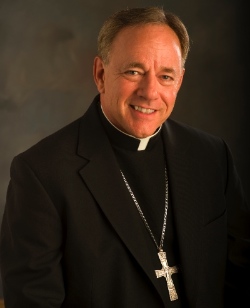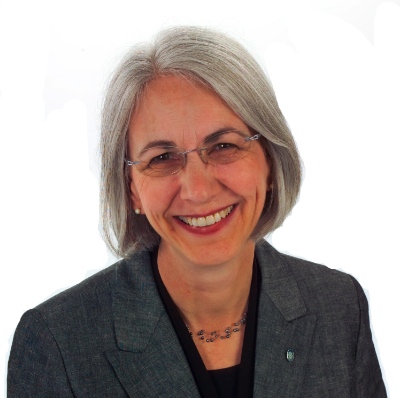
Dr. Margaret Cottle urged the Liberal government not to pursue Medical Assistance in Dying legislation.
On June 17 the federal government passed Bill C-14, which legalized the provision of physician assisted suicide and euthanasia, which is called Medical Assistance in Dying (MAiD).
Voices for restraint
Dr. Margaret Cottle spoke for many when she warned about the federal legislation in Care not killing: The most excellent way:
As Proverbs 14:12 says, “There is a way that seems right to a man, but in the end it leads to death.”
After 2,400 years of Hippocratic medicine, we are facing a new reality in many Western democracies. Under the banner of freedom and radical autonomy, the so-called “right” to choose the time and manner of one’s death has become a new rallying cry for those who reject what they perceive as paternalism driven by religious belief.
Country by country and state by state, the battle is being waged for the hearts and minds of citizens to sanction death as a part of healthcare under the guise of “compassion” and “choice.”
Demands for more
 Criticism died down over the summer, but now the pressure is on again. Most notoriously, a couple of ‘ethicists’ recently threw down the gauntlet (as reported in the National Post September 22):
Criticism died down over the summer, but now the pressure is on again. Most notoriously, a couple of ‘ethicists’ recently threw down the gauntlet (as reported in the National Post September 22):Authorities should bar doctors from refusing to provide such services as abortion and assisted death on moral grounds, and screen out potential medical students who might impose their values on patients, leading Canadian and British bioethicists argue in a provocative new commentary.
The paper by professors at Queen’s and Oxford universities, who are also editors of two major bioethics journals, throws rocket fuel onto a debate already inflamed by the new law allowing assisted death.
They argue that physicians have no right to opt out of lawful medical services – from abortion to prescribing contraceptives – that are requested by a patient and in the person’s interest.
Those who let conscientious objection affect patient care are clearly unprofessional, say Udo Schuklenk and Julian Savulescu.
“Doctors must put patients’ interests ahead of their own integrity,” they write in the journal Bioethics.
Challenges in BC
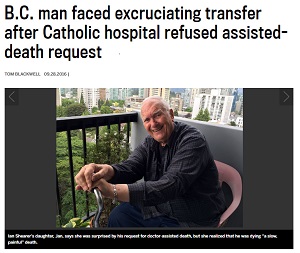 As well, the media continues to highlight hard cases. The Vancouver Sun, for example, featured this story September 27: B.C. man faces excruciating transfer after Catholic hospital refused assisted-death request. The story is very touching . . . and very political:
As well, the media continues to highlight hard cases. The Vancouver Sun, for example, featured this story September 27: B.C. man faces excruciating transfer after Catholic hospital refused assisted-death request. The story is very touching . . . and very political:
The combination of the cross-town trip and inadequate pain control left [Ian] Shearer, 87, in agony through most of his final hours, says daughter Jan Lackie. . . .
Lackie said the suffering her father endured shows why it is important that church-governed facilities, including dozens of hospitals, nursing homes and hospices across Canada, be required to allow assisted deaths within their walls.
“We have nine judges who said ‘Yes’ to medical assistance in dying,” she said. “I don’t understand how the Vatican has so much power, even here in Canada.”
The very next day, the Ottawa Citizen’s editorial board opined A publicly funded hospital can’t refuse assisted death (which was re-posted by the Vancouver Sun):
During the bleakest, most vulnerable period of their lives, terminally ill patients should be able to count on top-notch care and generous doses of compassion. But in one key area, Canada’s Catholic hospitals are letting them down. . . .
Force individual medical practitioners to end a life? No. Tell institutions to follow the law? Yes. A dignified ending shouldn’t be hostage to institutional beliefs.
Michael Miller, Archbishop of the Catholic Archdiocese of Vancouver, had anticipated these demands in a statement released April 14:
While Bill C-14 acknowledges the “personal convictions” of health care providers not to be involved in euthanasia or assisted suicide, it fails to recognize the right of health care institutions to reject providing these measures to patients entrusted to their care. Catholic hospitals, so long an integral part of Canada’s health care system, are left completely unprotected by this proposed law.
Fraser Health to mandate MAiD?
And there is a more immediate challenge. On October 11, the Fraser Health board will consider a decision to mandate that all palliative care units and hospice facilities in the Fraser Health region be required to provide MAiD within their units or facilities. (Fraser Health delivers a wide range of health care services to more than 1.6 million people living in communities stretching from Burnaby to White Rock to Hope.)
Miller put it this way in a September 27 open letter:
It is distressing to learn that the Fraser Health Authority board is considering mandating all palliative care units and hospice facilities under the Fraser Health Authority to provide “Medical Aid in Dying.”
The availability of assisted suicide/euthanasia in palliative care wards will undermine the contribution of palliative care at the very time it needs support and development. What a cruel dilemma to offer palliative care patients – compassionate care or death, as equally viable options.
Such a decision will also create a terrible conflict of interest for palliative care workers who see their departments as sacred places to alleviate suffering and honour human dignity. . . .
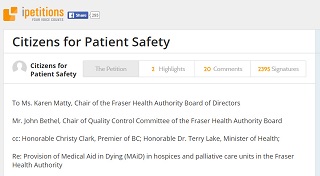 Following is the wording for a petition from Citizens for Patient Safety, which is advocating for a clear separation between palliative care service and MAiD.
Following is the wording for a petition from Citizens for Patient Safety, which is advocating for a clear separation between palliative care service and MAiD.To Ms. Karen Matty, Chair of the Fraser Health Authority Board of Directors
Mr. John Bethel, Chair of Quality Control Committee of the Fraser Health Authority Board
cc: Honorable Christy Clark, Premier of BC; Honorable Dr. Terry Lake, Minister of Health;
Re: Provision of Medical Aid in Dying (MAiD) in hospices and palliative care units in the Fraser Health Authority
As concerned citizens, it has come to our attention that all non-faith-based hospices and palliative care units in the Fraser Health Authority may be required to offer euthanasia and assisted suicide (MAiD) on their premises.
This is extremely distressing and would destroy the strong hospice and palliative care system in Fraser Health.
The World Health Organization defines palliative care as encompassing whole person care for patients and families that treats all symptoms with excellence and compassion and “neither hastens nor prolongs natural death.” Clearly, this care does not include euthanasia or assisted suicide (MAiD).
Patients at end of life are extremely vulnerable, and those who have chosen hospice or palliative care must be completely confident that they will be safe and treated without reference or exposure to hastened death in any form.
Decades of dedicated effort and education have been invested to reassure patients and the public that palliative care does NOT seek to hasten death. How sad to unravel all this careful work!
Studies and statistics in jurisdictions where MAiD is already practiced confirm that wrongful deaths do occur despite so-called “safeguards.”
Mandating, or even allowing, MAiD to be practiced in hospice or palliative care facilities would seriously undermine patient safety and comfort. Trust will be eroded and suffering will be greatly increased for many patients and families if the crucial perception of refuge and sanctuary is compromised in any way.
Hospices and palliative care units are designed to function as integrated communities, and patients and families are very aware of all that happens, is discussed and is recommended there. This will be true of everything regarding MAiD, and will, without a doubt, cause fear and confusion, deterring many from seeking the help they desperately need.
This may even mean that some would choose to avoid palliative care units and hospice facilities altogether or to go to faith-based facilities which may be far from their homes and loved ones, outcomes that would reflect very poorly on end of life care in Fraser Health.
Providing MAiD in specific, designated facilities that are distinct and separate from hospice and palliative care would go a long way to preventing some of these negative consequences of MAiD. It would also ensure that those who seek and qualify for these procedures have access to facilities that have the expertise and resources to accommodate these requests in a timely and respectful manner.
When dealing with particularly vulnerable patients, those in authority have the critical responsibility to reduce risks and to minimize harm. A complete separation between MAiD and palliative and hospice care is crucial in maintaining patient safety and reducing both the tragedy and the liability of wrongful deaths.
Thank you for your attention to this important matter.
******************************
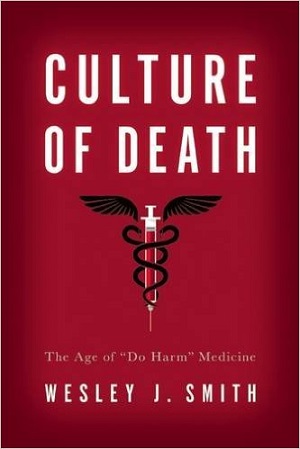 John Stackhouse made some pertinent comments in his September 26 book review of Culture of Death: The Age of ‘Do Harm’ Medicine. His Christianity Today review is timely, both for the Canadian situation as a whole, and for the current threat to palliative care units and hospice facilities here in BC.
John Stackhouse made some pertinent comments in his September 26 book review of Culture of Death: The Age of ‘Do Harm’ Medicine. His Christianity Today review is timely, both for the Canadian situation as a whole, and for the current threat to palliative care units and hospice facilities here in BC.Without cogent answers to these three questions [raised above], however, scaring us with what will likely be proposed sometime down the road won’t succeed in stopping what is being proposed now.
And, I can tell you from up north, it isn’t succeeding.
Sobering words, but not ones to prevent us from taking action. Things may get worse before they get better on the federal level. In BC, in the situation facing us right now, we can take some comfort from the fact that palliative care centres are already providing the kind of care that Stackhouse said is needed on a larger scale.

